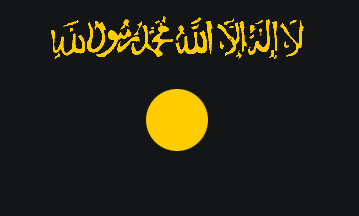Islamic fundamentalism (original) (raw)

This page is part of © FOTW Flags Of The World website
Last modified: 2015-03-07 by randy young
Keywords: [islamic fundamentalism](keywordi.html#islamic fundamentalism) | [al qaeda](keyworda.html#al qaeda) | shahada | islamism | [islamist extremism](keywordi.html#islamist extremism) |
Links: FOTW homepage |search | disclaimer and copyright | write us | mirrors
- Use of the black flag Flags of Islamic fundamentalist/Islamist extremist political organizations worldwide:
- al-Qaeda
- Abu Musab al-Zarqawi Organization (Iraq)
- Al Shabab (Somalia)
- Fatah al-Islam (Lebanon)
- Hizb ut-Tahrir
- Islamic Courts Union (Somalia)
- Flag of the Islamic Khilafah
- ISIS / ISIL (Islamic State of Iraq and Syria / Levant)
- Nation of Islam (United States)
- Palestinian Islamic Jihad Movement (Palestine) See also:
- Flags in politics
- Flags and religion
- Islam
- Islamic Extremism External links:
- Black Standard entry on Wikipedia
Use of the black flag
The recurrent appearance of black flags related to the installation of Islamic fundamentalist regimes in different countries, has led me to the conclussion that even though some of them are coordinated and strictly related armed proscribed movements, not all of them act as one umbrella organization, but rather share common objectives, such as the installation of sharia law, among other concepts.
This use of black flags with Shahada inscription on them and with the motto "There's no God but Allah" as representing a global jihad, was first pointed out by Ant�nio Martins-Tuv�lkin, 6 April 2012, when discussing UFE 11-32. Now after several years of seeing these flags with minor variations (ISIS in Iraq, ICU 8 in Sudan, and even flags of the same sort spotted in Palestine), one can also see these flags appear in Syria, Chechnya, Afghanistan, etc., where local (and even international Islamic fundamentalist groups) promote such armed actions. So in my opinion, this section called "Islamic Fundamentalism" should not only include al-Qaida (as it correctly does) but also include this Black Flag pattern that I have just mentioned, since it is the flag that most of these movements use and its inspiration refers to "the Mahdi, a long-since disappeared Imam who is believed by Shi'a Muslims to be due to reappear when the end of time approaches. The tradition mentions that prophet Muhammad said that the advent of the Mahdi would be signaled by "Black Standards" proceeding from Khorasan. Hence the use of black flags referring to Jihadists movements." (Source: http://en.wikipedia.org/wiki/Muqtada_al-Sadr)
I also wanted to point out that this extremism and radicalization was mainly carried out by al-Qaida (together with the Taliban as early as the late 1980s during the Mujahideen appeareance in Afghanistan, now followed by ISIS - which at one point was part of al-Qaida - but can trace its roots back as far as the Egyptian Revolution of 1952, the Iraq Coup d'Etat of 1963, the Libyan Revolution of 1969, the Iranian Revolution of 1979, and the different cultural/societal/political events that took place right before these events and developed afterwards, shifting these countries' foreign policies towards helping or directly intervening in other countries' internal issues with the respective Nationalist, pan-Arabist, and Islamist approaches, which derived in many occasions in radicalized movements, as well as the different conflicts that took place during the Cold War where confrontations arose and had long lasting consequences on today's psyche.
Esteban Rivera, 17 June 2014
al-Qaeda

image by Colonel Emerson Begolly, 14 September 2004
It is the new al-Qaeda flag, black with the "long version" of the Shahada in a yellowish colour and a yellowish circle in the center. I have seen the flag several times before before; I was in Iraq for the past 6 months. The flag is being debated as either Abu Mousab al-Zarqawi's al-Qaeda (Ansar al-Zarqawi) flag or the al-Qaeda flag in Iraq. I never actaully saw one flying, etc. This flag was used in the backround of several beheading videos. I was given, and still have, a captured flag like this one from another soldier who raided an abandoned al-Qaeda safe-house in Fullujah. The flag was not a machine-produced flag, but two pieces of black nylon with embroidered lettering and the circle in a light yellow. It was not made to fly, but rather to hang on a wall. I know another soldier who has a flag like that one, but only the lettering and circle is white, not yellow like the other one. The videos are not clear enough to tell whether the lettering and circle is white or yellow, but it probably differs depending on who made the particular flag.
Colonel Emerson Begolly, 14 September 2004